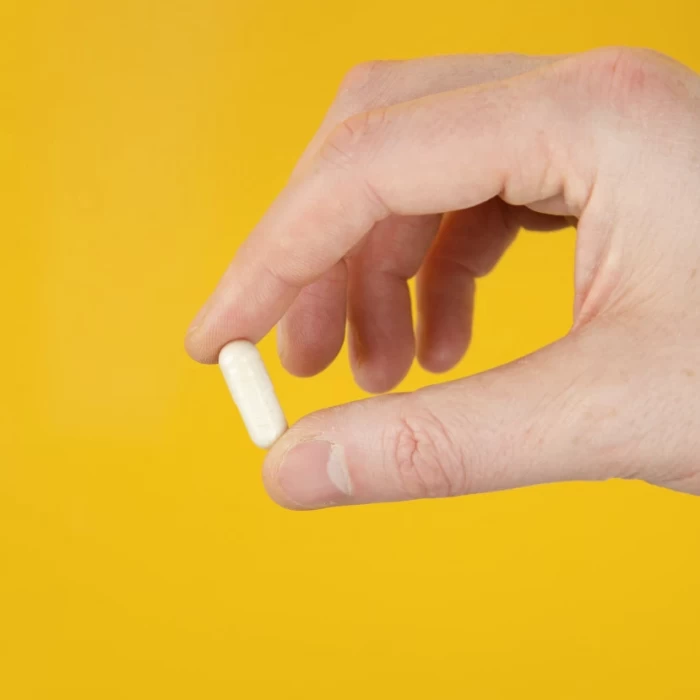Vitamin D - The Sunshine Superhero
By Dr Daniel Owens, PhD SENr6 Minute Read

6 Minute Read
Every Autumn we hear about getting enough vitamin D. But have you ever wondered about the magic behind vitamin D, often dubbed the 'Sunshine Vitamin'?
Let's dive into why it's highly beneficial for your health and performance, and some easy steps you can take to maintain your vitamin D levels year-round.


Why Vitamin D Matters
Vitamin D isn't just another supplement; our body has a requirement for it since it cannot be made within the body. It's a key player for your bones, muscles, and immune system.
Most of our vitamin D comes from exposing the skin to sunlight (around 80-90% of our requirement), with a small portion from our diet from sources like oily fish and dairy products.
However, many people, especially during those gloomy Winter months, find themselves lacking this vital nutrient because sunlight exposure is limited.
It's estimated that 40% of people in Europe have vitamin D deficiency (Cashman, 2020), but it's a simple fix that can have important outcomes for your health and performance.
Vitamin D Metabolism Simplified
Here's a quick breakdown of how vitamin D is obtained and works in your body.
Ultraviolet B (UVB) radiation from sunlight converts a substance in your skin into Vitamin D3, or you may eat some vitamin D containing foods or a supplement. Whichever way you get the vitamin D, it then travels through your bloodstream to your liver and kidneys, turning into the active form your body can use. This process is vital for regulating bone health, immune function, muscle repair and metabolism.
Understanding Vitamin D Levels
Measuring vitamin D can be tricky since it requires a blood test and often isn’t cheap. Moreover, people from different ethnic backgrounds may show variations in vitamin D levels, and the current science suggests there may not be a one-size-fits-all method to assess an individuals vitamin D status. However, if you do get a vitamin D blood test, current science recommends a blood level of above 75 nmol/L is sufficient.
We understand that blood tests are not always accessible, so let’s take a look at the risk factors, which can help you determine if you might have low vitamin D levels.
Any factors that limit sun exposure are likely to have the biggest effect on our vitamin D levels. Indoor living and working, covering up the skin year-round with clothing, using high-factor sunscreen year-round, cloud cover, and season of the year are the main risk factors (Chen et al., 2007). Even if the sun is out during the Winter, you won’t be making vitamin D in your skin, since the sun is too low in the sky and not enough of its UVB actually makes it to the earths surface (and therefore your skin!).
The Importance of Vitamin D for Active Individuals
Maintaining a good vitamin D status (>75 nmol/L) is crucial for bone health, muscle function, and immune support.
With chronically low vitamin D levels, we see weaker bones that are more susceptible to fracture. Muscle function and metabolism can be impaired meaning potentially sub-optimal adaptation to your training, and a significant increase in your susceptibility to infection. What’s more, when vitamin D levels are low the severity of those infections and the length of time you have symptoms for can worsen.
However, it's not about trying to ramp up your vitamin D levels as high as you can, but rather avoiding deficiencies and trying to keep your levels above 75 nmol/L year round.
More is not better with vitamin D and the focus should be on getting your level of vitamin D into the normal range rather than trying to mega boost your levels.
In the Summer months, safe sun exposure (avoiding burning) is typically enough to maintain sufficient status. However, during Winter this is rarely achievable and a supplementation strategy is often required.
Smart Supplementation
Firstly, the type of vitamin D matters and with the minefield of supplements out there, we’re here to help you make the best choice.
Vitamin D3 is more effective than Vitamin D2 and should be the type of vitamin D supplement you opt for. But remember the golden rule: moderation is key. A daily dose of 1000-2000 IU is usually sufficient and there are plenty of supplements out there containing 5x as much as this, which simply isn’t necessary. It’s estimated that this intake of 1000-2000 IU/day is what most of the adult population require to maintain their vitamin D levels (Cashman et al., 2020).
It’s also important to ensure that you have a good amount of calcium in your diet as it works synergistically (together) with vitamin D. Dairy products are among the most well-known and rich sources of calcium. This includes milk, cheese, yogurt, and fortified dairy alternatives like almond or soy milk. Dairy products not only provide a high amount of calcium but also contain a little bit of vitamin D and are typically good sources of protein.
Final Thoughts
Vitamin D is important for general health and helping you get the most out of your training. The key is to maintain adequate levels, especially during Winter.
Across the Summer months, sensible sun exposure is recommended, while in Winter, supplementation is advised for most people. By understanding and managing your vitamin D levels, you can better protect your health, exercise recovery and overall performance.
Chen TC, Chimeh F, Lu Z, Mathieu J, Person KS, Zhang A, Kohn N, Martinello S, Berkowitz R, Holick MF. Factors that influence the cutaneous synthesis and dietary sources of vitamin D. Arch Biochem Biophys. 2007 Apr 15;460(2):213-7. doi: 10.1016/j.abb.2006.12.017. Epub 2007 Jan 8. PMID: 17254541; PMCID: PMC2698590.
Cashman KD. Vitamin D Deficiency: Defining, Prevalence, Causes, and Strategies of Addressing. Calcif Tissue Int. 2020 Jan;106(1):14-29. doi: 10.1007/s00223-019-00559-4. Epub 2019 May 8. PMID: 31069443.
The Edge HPL is not responsible for any specific health or allergy needs that require supervision nor any adverse reactions you may have to the advice we provide - whether you have followed them as written or have modified them to suit your dietary requirements.
Any nutritional advice and information provided by The Edge HPL is based on our own experiences, research and knowledge. The information provided is not to be used in place of proper medical advice. The Edge HPL and its employees and representatives are not medical professionals, do not hold any type of medical licenses or certifications and do not practice medicine. If customers have any medical questions regarding any advice or information provided by The Edge HPL, they should consult their physician, or another healthcare professional. Please also refer to our Standard Business Terms and Conditions, which can be found on our website.